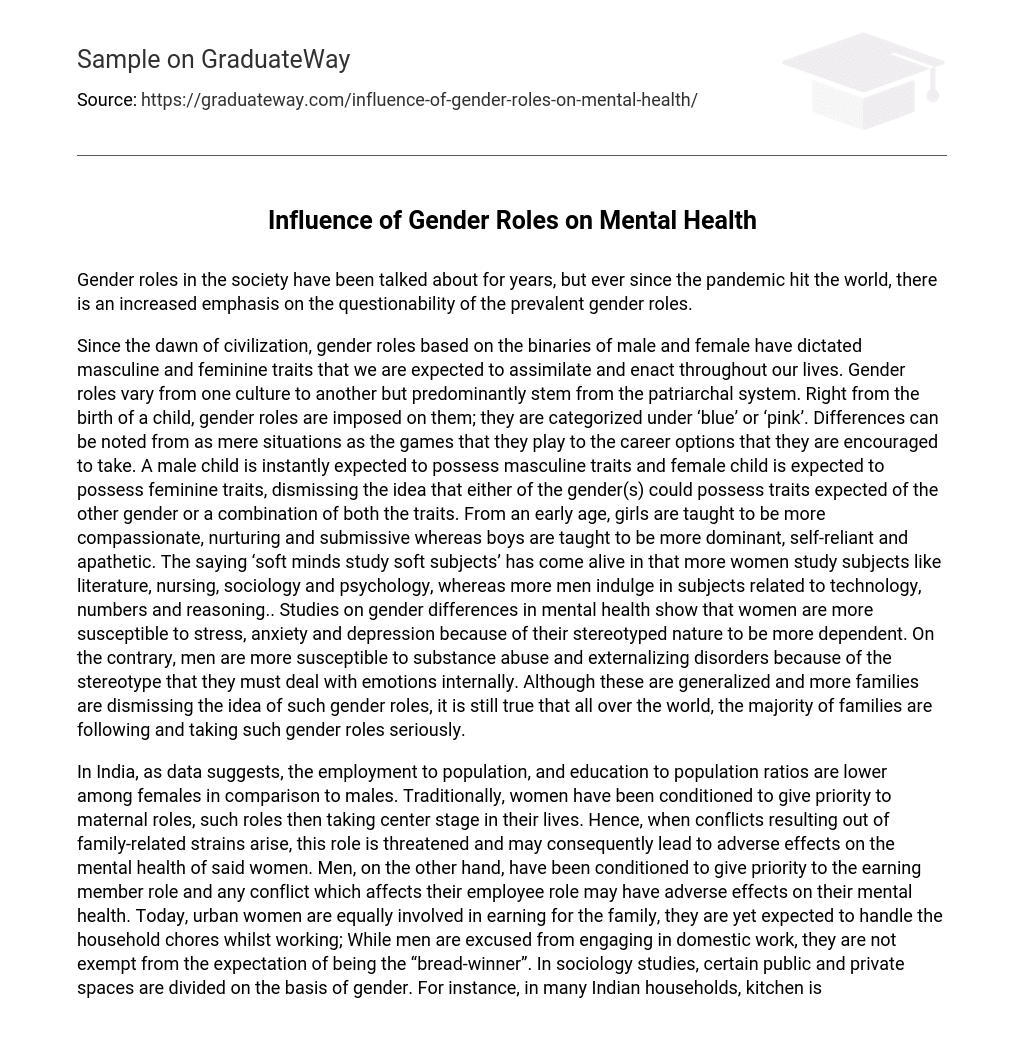Gender roles in the society have been talked about for years, but ever since the pandemic hit the world, there is an increased emphasis on the questionability of the prevalent gender roles.
Since the dawn of civilization, gender roles based on the binaries of male and female have dictated masculine and feminine traits that we are expected to assimilate and enact throughout our lives. Gender roles vary from one culture to another but predominantly stem from the patriarchal system. Right from the birth of a child, gender roles are imposed on them; they are categorized under ‘blue’ or ‘pink’. Differences can be noted from as mere situations as the games that they play to the career options that they are encouraged to take. A male child is instantly expected to possess masculine traits and female child is expected to possess feminine traits, dismissing the idea that either of the gender(s) could possess traits expected of the other gender or a combination of both the traits. From an early age, girls are taught to be more compassionate, nurturing and submissive whereas boys are taught to be more dominant, self-reliant and apathetic. The saying ‘soft minds study soft subjects’ has come alive in that more women study subjects like literature, nursing, sociology and psychology, whereas more men indulge in subjects related to technology, numbers and reasoning.. Studies on gender differences in mental health show that women are more susceptible to stress, anxiety and depression because of their stereotyped nature to be more dependent. On the contrary, men are more susceptible to substance abuse and externalizing disorders because of the stereotype that they must deal with emotions internally. Although these are generalized and more families are dismissing the idea of such gender roles, it is still true that all over the world, the majority of families are following and taking such gender roles seriously.
In India, as data suggests, the employment to population, and education to population ratios are lower among females in comparison to males. Traditionally, women have been conditioned to give priority to maternal roles, such roles then taking center stage in their lives. Hence, when conflicts resulting out of family-related strains arise, this role is threatened and may consequently lead to adverse effects on the mental health of said women. Men, on the other hand, have been conditioned to give priority to the earning member role and any conflict which affects their employee role may have adverse effects on their mental health. Today, urban women are equally involved in earning for the family, they are yet expected to handle the household chores whilst working; While men are excused from engaging in domestic work, they are not exempt from the expectation of being the “bread-winner”. In sociology studies, certain public and private spaces are divided on the basis of gender. For instance, in many Indian households, kitchen is a space which is most accessed by females whereas, the living room is most accessed by males. With the onset of the COVID-19 Pandemic, came along a stringent rule to stay indoors this saw a rise in the gap in employment and education between females and males. With other factors into play, this gap was also witnessed because of the implied gender roles. Women, including the ones who are employed, were burdened with the responsibility of managing domestic work. Men, who are considered the prime breadwinners of the family, lost jobs or saw a rise in pay-cut. This lead to increased stress and to the question about whether such stereotyped gender roles are essential in today’s society and what impact it can have on an individual’s mental well-being.
In order to tackle such imposed stigmas it is crucial to realize that we need to normalize the concept of everyone being involved in all spheres of development and break the barriers of gender roles. Although it is not easy to break this stigma, on an individual level initiatives can be taken. Formerly, one can gender neutralize the activities, roles and interests of children in the house. Practice diverse roles so that not only one improves their own horizon but also acts as a role model for their peers, friends and family. Promote women and men around to be independent in their decisions, regardless of the society’s prejudices against them. Accept women in less nurturing and compassionate roles and provide them with a space to select their own path in relevance to education, career and marriage. Encourage men to be expressive about their emotions and normalize the concept of them not being the sole earning members of the family.
Gender roles do not only influence the social setup but also adversely affect mental health of people. Imposed gender roles cause conflict between an individual’s actual self and expected self which can lead to disorders related to stress, anxiety, depression and substance abuse. Expected gender roles are binary and neglect people who do not identify as either, which may further lead to identity and personality related disorders. In India going to therapy is still a taboo, so even if an individual is suffering from an issue arisen from imposed gender roles, the issue will be considered irrelevant. For example, if a man indulges in substance abuse as a maladaptive coping mechanism to suppress his emotions it will be considered normal by the society. Prevalent gender roles remain to be a less talked about aspect in the society and therefore it is important to discourage stereotyped and prejudiced gender roles and encourage individuals to look beyond their own and others’ gender with the regard to social, political and economic status; thus creating a better space for conversations revolving mental health.





